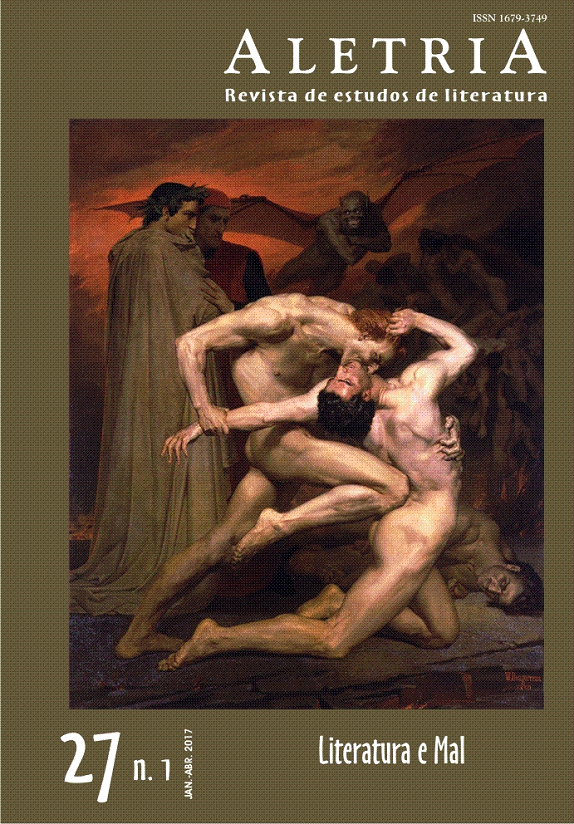The Evil in Medieval Literature: The Example of the Incontinent Student
DOI:
https://doi.org/10.17851/2317-2096.27.1.73-89Keywords:
medieval literature, François Villon, representation of the evilAbstract
In this paper, we discuss the representation of the evil by medieval literature through the example of the incontinent student, in particular, the character of the famous villain François Villon. For that, we focus on deciphering the enigmatic conclusion of his first long poem, Lais, whose metalinguistic description of the lover’s loss of consciousness gives a scholastic explanation for his mental disorder. This explanation allows Villon to justify the escape of Paris through his incontinence, which is both loving and moral at the same time, as always happens in the courtly literature of the time.
Downloads
References
AQUINO, Tomás de, Santo. Comentario a la Ética a Nicómaco de Aristóteles. Navarra: Ediciones Universidad de Navarra, 2010.
ARISTÓTELES. Acerca del alma. Madrid: Gredos, 1978.
ARISTÓTELES. Ética nicomáquea; ética eudemia. Madrid: Gredos, 1985.
BURGER, André. L’entreoubli de Villon. Romania, Paris, v. 79, n. 316, p. 485-495, 1958.
CHAPELÃO, André. Tratado do amor cortês. São Paulo: Martins Fontes, 2000.
CHARTIER, Alain; HERENC, Baudet; CAULIER, Achille. Le cycle de La belle dame sans mercy: une anthologie poétique du XVe siècle. Paris: Champion, 2003.
CHASTELLAIN, Georges. Œuvres. Bruxelles: Heussner, 1865.
CORBECHON, Jean. Le livre des propriétés des choses. Paris: Stock, 1997.
COSTA, Daniel Padilha Pacheco da. François Villon, um poeta maldito avant la lettre? A Balada dos enforcados como um modelo poético de Rimbaud, Pound e Augusto de Campos. Estação Literária, Londrina, v. 12, p. 70-85, 2014.
COSTA, Daniel Padilha Pacheco da. O amor cortês pelo avesso: François Villon e o debate sobre o Roman de la rose. Caligrama: Revista de Estudos Românicos, Belo Horizonte, v. 19, n. 1, p. 81-103, 2014. https://doi.org/10.17851/2238-3824.19.1.81-103
DRAGONETTI, R. Le contredit de François Villon. MLN, Baltimore, v. 98, n. 4, p. 594-623, 1983. https://doi.org/10.2307/2905896
DRAGONETTI, Roger. La soif de François Villon. In: DERENS, Jean; FREEMAN, Michael; DUFOURNET, Jean. Villon: hier et aujourd’hui. Paris: La Bibliothèque de la Ville de Paris, 1993. p. 123-136.
GARLANDE, Jean. Parisiana poetria: De arte prosayca, metrica et rithmica. New Haven: Yale University Press, 1974.
GROSSETESTE, Robert. The Greek Commentaries of the Nicomachean Ethics of Aristotle in the Latin Translation of Robert Grosseteste. Leiden: Brill, 1973-1991. 4 v.
KOROLEC, Jerzy. Le commentaire d’Averroès sur l’Éthique à Nicomaque. Bulletin de Philosophe Médiévale, Brepols Pubishers, v. 27, p. 104-107, 1985.
KUHN, David. La poetique de François Villon. Paris: Librairie Armand Colin, 1967.
LACY, Norris. In defense of Villon’s Lais. The French Review, Marion, v. 72, n. 6, p. 1000-1009, 1999.
LONGNON, Auguste. Étude biographique sur François Villon d’après les documents inédits conservés aux Archives Nationales. Paris: Menu, 1877.
PAUL, Jacques. L’Histoire intellectuelle de l’Occident médiévale. Paris: Armand Colin, 1973.
PORTALO, Rocío Orsi. El saber del error: filosofía y tragedia en Sófocles. Madrid: Plaza y Valdés, 2007.
SPINA, Segismundo. A lírica trovadoresca. 4. ed. São Paulo: Edusp, 1991.
VERLAINE, Paul. Les poètes maudits: Tristan Corbière, Arthur Rimbaud, Stéphane Mallarmé. Paris: Léon Vanier, 1884.
VILLON, François. Œuvres complètes. Paris: Gallimard, 2014.
VILLON, François. Poesia. Org., trad. Sebastião Uchoa Leite. 2. ed. São Paulo: Edusp, 2000.
ZUMTHOR, Paul. Anthologie des grands rhétoriquers. Paris: UGE, 1978.
Downloads
Additional Files
Published
How to Cite
Issue
Section
License
Copyright (c) 2017 Daniel Padilha Pacheco da Costa (Autor)

This work is licensed under a Creative Commons Attribution 4.0 International License.
Authors who publish with this journal agree to the following terms:Authors retain copyright and grant the journal right of first publication with the work simultaneously licensed under a Creative Commons Attribution Non-Commercial No Derivatives License that allows others to share the work with an acknowledgement of the work's authorship and initial publication in this journal.Authors are able to enter into separate, additional contractual arrangements for the non-exclusive distribution of the journal's published version of the work (e.g., post it to an institutional repository or publish it in a book), with an acknowledgement of its initial publication in this journal.Authors are permitted and encouraged to post their work online (e.g., in institutional repositories or on their website) prior to and during the submission process, as it can lead to productive exchanges, as well as earlier and greater citation of published work (See The Effect of Open Access).





